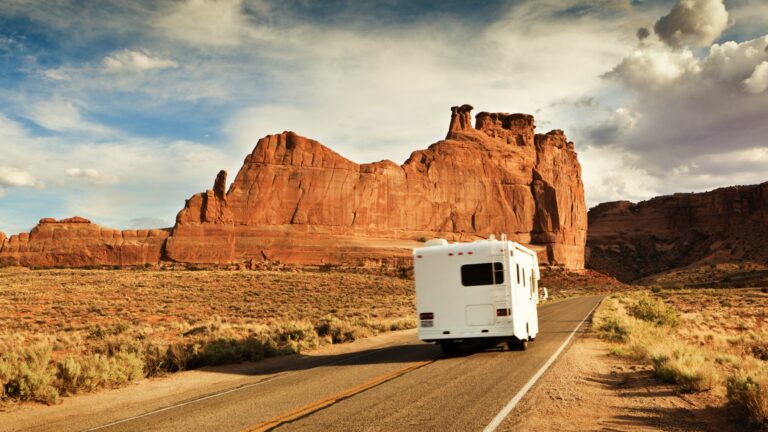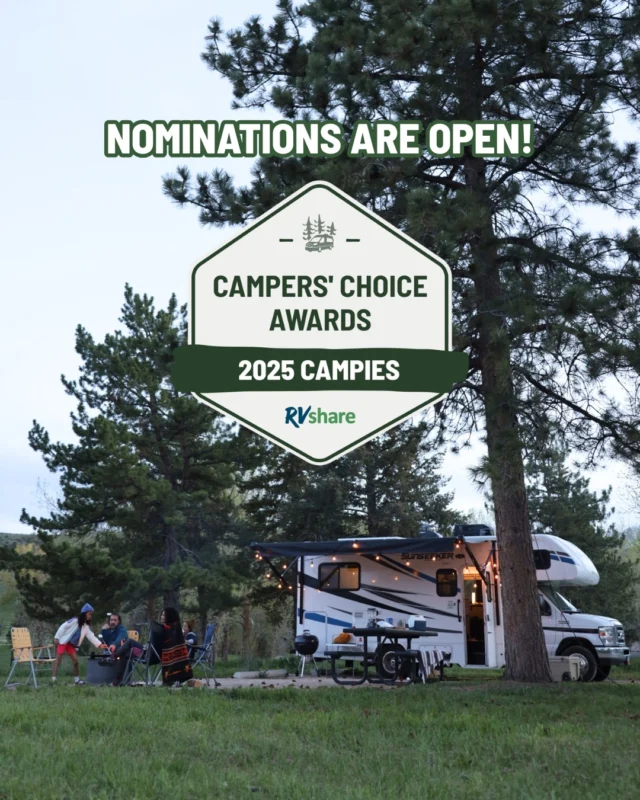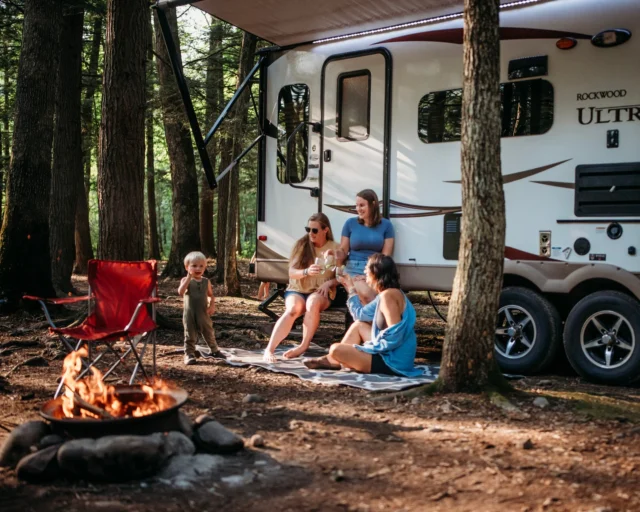
Thinking of giving RVing a try? Great idea! There is nothing quite like the freedom of hitting the open road in a tiny home-on-wheels. That said, there are some things you’ll want to know before you take your first trip.
In this guide we will discuss RVing for beginners. We’ll cover everything from how to use hookups to how to drive an RV. We will also talk about the various types of RVs so you know which kind to rent in order to give RV living a try.
Table of Contents
Some pro tips from seasoned RVers on Reddit
RV tips and tricks you’ve learned along the way
byu/mintycrash inRVLiving
The Different RV Types
Let’s start by discussing the various types of RVs. After all, knowing what options are available to you is a great place to start as you learn about RVing for beginners.
Essentially, there are two categories of RVs: driveables and towables. From there, each category branches off into a few different RV types.
These include:
- Class A driveable — Large bus-like motorhome.
- Class B driveable — Small campervan motorhome.
- Class C driveable — Medium-sized motorhome on a van chassis.
- Travel trailer towable — Trailer that hitches to the bumper.
- Fifth wheel towable — Large trailer that hitches inside the bed of a truck.
- Pop-up towable — Small trailer that folds flat for travel and pops up to create living space.
- Slide-in truck camper — Small camper that slides into a truck bed.
Understanding the Basic Components of your RV: Water, Electricity and Hookups
Once you pick out an RV and arrive at your campsite, you will need to know how to hook the rig up to the various campsite utilities and make use of your RV water tanks. This will ensure you get the most out of the comforts your RV offers, making it an important thing to learn as you dive into RVing for beginners.
RV Water Tanks Explained
Generally speaking, RVs have three water tanks:
- A fresh water tank to hold clean, potable water.
- A gray water tank to hold used water from the sinks and shower.
- A black water tank to hold used water from the toilet.
If your campsite does not have a water spigot, you can fill your fresh tank at home at the beginning of a camping trip and use the RV’s water pump to pull water from the tank and through the faucets in your rig. The used water is then stored in the gray and black tanks until you dump it into a sewer dump at your campsite or at a dump station.
Using Electricity in Your RV
Using electricity in your RV is pretty easy in most cases. Many campsites include an electric hookup. In these cases, you can plug into the campground electricity and use your RV appliances and outlets just as you would in a house, being careful not to use too much so you don’t trip the breaker.
That said, if your campsite does not include an electrical outlet, you may have to rely on your RV’s batteries. In this case, you will only be able to use appliances that run on DC power. These include lights, fans, the propane fridge, the propane water heater, and the furnace.
If you wish to use the more power-consuming appliances in your RV when electric hookups are not available, you will need to run a generator or use an inverter to change the power stored in your RV batteries from DC power to AC power. If you choose to do the latter, you will need a good-sized battery bank and a way to top the batteries off when they get low. A generator, solar panels, or a combination of both will get the job done.
12 Quick Steps for Using RV Hooking Ups
To connect your RV to campground hookups, follow the simple steps below.
Hooking up Water
- Connect a water pressure regulator to the water spigot.
- Connect one end of your fresh water hose to the water pressure regulator.
- Connect the other end of the fresh water hose to the city water inlet on your RV.
- Turn the water on at the spigot, adjusting the pressure as needed.
Connecting to Electricity
- Make sure the breaker is switched off.
- Plug in the RV surge protector and switch the breaker on.
- Check the surge protector for warnings.
- If all is well, turn the breaker off, plug the RV power cord into the surge protector, and flip the breaker on.
Hooking Up Sewer
- Wearing disposable gloves, connect one end of your sewer hose to the sewer hookup on your site, making sure to twist it into place.
- Connect the other end of the sewer hose to the sewer outlet on the RV.
- Dump the black tank first if needed.
- Close the black tank and open the gray tank next, leaving it open for the duration of your camping trip if you wish.
RV Maneuverability: Driving and Towing
Driving an RV does feel a bit overwhelming at first. In fact, it’s one of the least appealing parts of learning about RVing for beginners. That said, as long as you are careful and practice before driving on the highway, you can drive an RV safely.
Here are some top tips:
- We recommend heading to a large empty parking lot and practicing things like turning, stopping, and backing up.
- When you do get on the road, leave a large amount of space between yourself and the vehicle in front of you in order to ensure you are able to stop all of the extra weight you’re carrying. The forward momentum is much greater than a car’s, and you must account for it always.
- Make wide turns. One of the most common mistakes new RVers make is cutting turns too sharp, whether it’s at intersections, while leaving fuel pumps, or elsewhere. Your side mirrors will help you monitor the clearance at the back of your rig while turning. Don’t be afraid to take it slow if you need to.
- Always, always use a spotter when backing up or squeezing into tight places. Some RVers keep pairs of walkie-talkies around just for this purpose.
Driving a Motorhome
If you’re driving a class B, your experience won’t actually be all that different from the experience of driving any other van. Driving a class C is also similar to driving a van, but obviously you will need to be aware of your length and height, and make sure to give yourself plenty of room to make wide turns.
Because your wheels are right under you when driving a class A, the experience of driving this kind of coach is quite different. You’ll want to practice turning and backing in for sure.
Towing a Travel Trailer
Towing a travel trailer requires that you have the correct hitch setup and towing vehicle. Make sure your truck is capable of towing the trailer you choose safely, and make sure your hitch is rated for the trailer you choose. It’s also important to use weight distribution when called for, and sway bars can be extremely helpful for reducing sway.
Another good thing to invest in? Towing mirrors that will allow you to see everything.
What to Pack: Essential Gear for RV Travel
Packing for an RV trip is different from packing for other types of travel. In addition to the usual clothes and toiletries, you also have to pack household items like dishes and cleaning supplies.
Here’s a basic list of things you might need:
- Clothes
- Shampoo and conditioner
- Soap
- Toothbrushes and toothpaste
- Hairbrush and comb
- Medications
- First aid kit
- Towels and washcloths
- Sheets
- Blankets
- Pillows
- Dishes
- Silverware
- Pots and pans
- Cooking utensils
- Food
- Toys, games, and sports equipment
- Camp chairs
- Sewer hose kit
- Fresh water hose
- Water pressure regulator
- RV surge protector
- Leveling blocks
- Tools
Choosing Your Route and Campground
Choosing the right campground and the best route to get there is crucial for ensuring you have a safe and enjoyable camping trip. Here’s what you need to know as you dive into this RVing for beginners adventure.
Choose Roads Carefully
Some roads are NOT RV-friendly. Avoiding such roads is important. Things to look out for include low-clearance bridges, steep grades, tight roads, and expensive toll roads that charge by the axle.
A trucker’s road atlas will help with this. Services such as RV Life’s RV Trip Wizard can also be extremely helpful when planning an RV route.
Make Sure Your RV Fits In Your Campsite
Before booking a campsite, take a look at the site description. It’s important to make sure your RV will fit in the site you choose. Additionally, it’s important to have a look at the amenities offered to ensure they meet your needs. For instance, if you require electricity, you’ll want to make sure an electric hookup is available.
Different Kinds of Campgrounds
When shopping for the right campground, it helps to have an understanding of the different kinds of campgrounds out there.
These include:
- Private campgrounds — More expensive with more amenities.
- State parks — Moderate cost in beautiful places.
- National parks — Low cost, in beautiful locations, often with few amenities and site restrictions.
- City parks — Low cost (sometimes free) with minimal amenities and sometimes with stay limits.
- Dry camping spots (BLM, Forest Service, etc) — Very low cost or free, usually with no amenities.
RV Safety Basics
Last but definitely not least, we should discuss basic RVing for beginners safety rules. Use the tips below to ensure your stay safe no matter where you roam.
Always Do a Walk-Around
Before every single trip, do a walk-around. Make sure trailers are hitched up properly, check tires for wear and proper pressure, and look for anything out of place.
Test Alarms
The alarms in your RV are there for a reason. You should have a smoke alarm, a carbon monoxide detector, and a propane detector. Test each of these before each trip and replace the alarms/batteries as needed.
Load Up Properly
The way you load your RV will change how it drives. You want to balance the weight of your load as much as possible and never ever exceed the safe cargo carrying capacity.
Drive Carefully
The driving tips mentioned above, combined with the tips for choosing a safe route we wrote out, should help you drive carefully and keep yourself and your passengers safe on the road. It’s also important to avoid driving in bad weather and pull over any time you start to feel tired.
Carry Safety Equipment
Carrying a first aid kit, extra blankets, plenty of food and water, and things like traffic cones, a shovel, a spare tire, tools, and rope might help you get out of a bind. Always keep these safety items on hand.
Invest in Roadside Assistance
Roadside assistance can be a lifesaver when you find yourself broken down on the side of the road. RV roadside assistance is pretty inexpensive and a worthwhile investment if you ask us.
Have a Way to Call for Help
Of course, that roadside assistance won’t be any good if you don’t have a way to call for help. If you’ll be traveling to an area with no cell signal, consider carrying a Starlink setup with a car inverter to run it off of. This will allow you to make emergency calls even when no cell signal is available. A satellite phone can also be helpful in such situations.
Trust Your Gut
Finally, it is incredibly important that you always trust your gut. If your gut tells you that a situation is unsafe, get out as soon as possible.
There you have it, everything you need to know about RVing for beginners. As long as you go in with a good handle on these basics, it’s easy enough to pick the rest up as you go along. Keep the info above in mind, rent an RV, and get out there and have an adventure!






